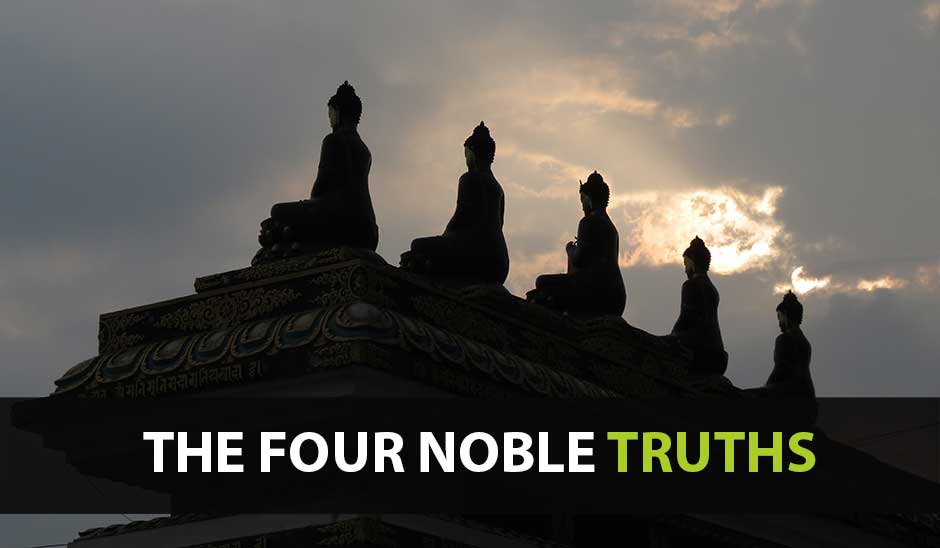The Four Noble Truths of Buddhism
Last Updated: January 02, 2025
Tweet
The Four Noble Truths, unveiled by the Buddha in his first sermon, form the core of Buddhism. They address suffering, its cause, its end, and the path to liberation, offering a roadmap for navigating life and achieving enlightenment.
Central to the Four Noble Truths is the acknowledgment of suffering as a fundamental part of life, revealing the inherent challenges of the human condition. However, within this recognition lies the opportunity for freedom, as comprehending the causes of suffering opens the path to its end. The Noble Eightfold Path, which builds upon the Four Noble Truths, provides a structured method to reduce suffering and reach spiritual enlightenment. Therefore, these truths act as a guiding light, leading followers to a deep comprehension of life's uncertainties and the achievement of inner tranquility.
Please click here to get the complete details on available programs, volunteer’s roles and activities , accommodation, cost, visa , vaccination, airport arrival and the rest of it.
Get More Info Now »
The first truth
The first truth asserts that existence, whether worldly or otherwise, is marked by imperfection and suffering, perpetually elusive of complete satisfaction and happiness. It serves as a diagnostic elucidation by the Buddha, emphasizing the inherent suffering ingrained within all beings.
Life, according to the first truth, entails suffering, owing to the inherent imperfections of human nature and the world we inhabit. Throughout our existence, we inevitably confront various forms of suffering, encompassing physical ailments and psychological distress. Despite occasional moments of well-being and joy, life remains imperfect due to its transient nature, wherein even the most blissful moments dissipate. Thus, the first truth underscores the impermanence that characterizes life, reminding us that both ourselves and our loved ones are subject to eventual dissolution.
The second truth
The second truth delves into the analysis of the diagnosis, concluding that the origins of suffering lie within the recesses of our own minds. This realization forms the crux of the Buddha's diagnosis. Suffering, as elucidated by the second truth, emanates from desires, attachments, and aversions ingrained within our consciousness.
The Second Noble Truth pinpoints attachment to impermanence as the root of suffering. This includes clinging to objects, thoughts, and even the illusion of a separate self. Ignorance fuels this attachment, while desire for fleeting pleasures like status or wealth strengthens it. Ultimately, this attachment leads to inevitable loss and suffering.
The third truth
The third truth illuminates the possibility of liberation from suffering by addressing the cessation of its underlying causes. It asserts that the eradication of these causes heralds the cessation of suffering itself.
Attaining the end of suffering involves nirodha, marked by shedding sensual cravings and emotional bonds. This profound evolution progresses through various phases, leading to the ultimate realization of Nirvana. Nirvana symbolizes liberation from earthly worries, troubles, uncertainties, and mental constraints. However, grasping the concept of Nirvana eludes those who have not embarked on the journey towards its actualization.
The fourth truth
In the fourth truth, the Buddha delineates the Noble Eightfold Path as the therapeutic regimen for our spiritual healing. This path, designed to lead to the cessation of suffering, embodies a comprehensive framework for personal transformation and liberation from the cycle of rebirth.
The Noble Eightfold Path represents a gradual process of self-realization, often termed the Middle Way for its avoidance of extremes. It navigates between a life of indulgence in desire and materialism and a life of asceticism and self-torment. Through diligent practice and adherence to this path, characterized by right understanding, intention, speech, action, livelihood, effort, mindfulness, and concentration, individuals gradually dissolve greed and attachment, ultimately extinguishing the causes of suffering.
Please click here to get the complete details on available programs, volunteer’s roles and activities , accommodation, cost, visa , vaccination, airport arrival and the rest of it.
Get More Info Now »


